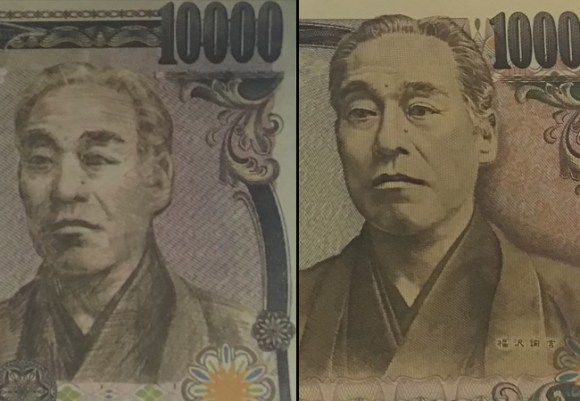
Aichi resident makes surprisingly effective use of many of Japan’s beloved services to pull off his ill-fated forgery attempt.
On 30 August, Aichi Prefectural Police announced the arrest of Yoshiyuki Kamiya of Nagoya for violation of the Currency and Securities Control Act. Kamiya stands accused of passing off five counterfeit 10,000 yen bills (approximate to US$100 bills) as legal tender.
The bills in question were actually taken from a children’s play money set. We have covered toy money scams in the past and it may come across that the victims are somewhat slow on the uptake. But as any parent in Japan will tell you, that toy money here is surprisingly realistic looking in terms of color scheme and general layout.
Not only that, it can be purchased from one of Japan’s many 100-yen shops for – you guessed it – 100 yen ($0.90).
However, as you can easily see below there is a huge size discrepancy between the fake bill and the real deal. In the case of Kamiya, he is accused of using a small bill that measured five centimeters by ten centimeters (two by four inches) whereas a regular 10,000 bill is about 7.5 centimeters by 16 centimeters (three by six inches).
So, Kamiya allegedly headed over to one of the many, many convenience stores in Japan that come equipped with a high-quality color copy machine. After spending about 80 yen ($0.72) he was able to resize the play money to the correct width and length making it much more similar to the real thing.
▼ 7-Eleven’s copy machine’s boast an array of features, but counterfeiting is not one of them.
However, there were still two lingering problems. First, the bills had no backside. Moreover, they had “Children’s Bank” printed on them a few times.
Luckily, in Japan it is not uncommon to pay money – especially large sums – inside of an envelope. It easy to understand why; no one wants to be flashing around large wads of cash for matters of both sophistication and security. However, it certainly does require a degree of trust between both parties.
It was exactly that trust that Kamiya is accused of abusing when he allegedly went to a hotel in Nagoya on 11 August and paid for the services with an envelope containing the fraudulent 50,000 yen ($452). The front desk was satisfied taking a customary quick tally of five Yukichi Fukuzawa faces by peeking into the envelope and reportedly sent Kamiya on his way.
It wasn’t until later that the clerk realized she had been swindled and called the police. Although they didn’t say how Kamiya slipped up, whether through fingerprints, DNA, information left at the hotel, or surveillance footage, it didn’t take long for them to make an arrest on 14 August. In custody, Kamiya is said to have admitted to the crimes.
Let this be another lesson that there are no quick schemes to getting money. You just have to do it the old-fashioned way like everyone else by writing a hit song song about apples and pens or becoming a sexy cosplayer.
Source: Mainichi Shimbun via Otaku.com
Images ©SoraNews24 (courtesy my 4-year-old daughter)